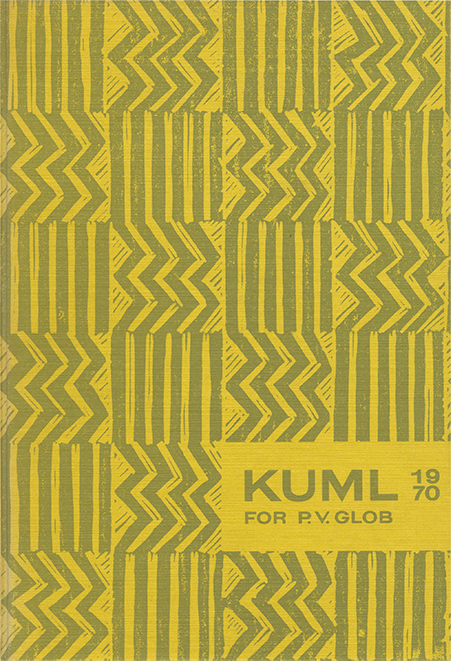Det frie felt. P. V. Glob og de danske provinsmuseer
DOI:
https://doi.org/10.7146/kuml.v20i20.105412Nøgleord:
P. V. Glob, Glob, Danish provincial museums, danske provins museerResumé
A clear field
P. V. Glob and the Danish provincial museums.
When P. V. Glob in 1949 was appointed director of the Prehistoric Department of Århus Museum, Danish provincial museums received the impetus for a development the end of which is not yet in sight. Although, in a large number of provincial museums, valuable work was being carried out, Glob's connection with the museum of the largest provincial town was a real turning point in their history. They became aware for the first time that excellence was not confined to the capital.
Glob's Forhistorisk Museum soon took the lead in prehistoric investigations throughout Jutland and developed, through the agency of the Jutland Archaeological Society, an extensive network of contacts which have been important for the reputation of archaeology among laymen.
In a wave of succesful and timely initiative, Glob's museum underwent an expansion to embrace new tasks and objectives: the prehistoric park at Moesgaard, and the still uncompleted expeditions to the Persian Gulf, where numerous Danish museum workers received a schooling for life. The lid was knocked off of all conceptions of what a provincial museum can and should be.
Glob also joined that small band who prepared the 1958 Museum Law, which contained economic temptation for smaller towns to expand their museums. The year after this law came into force (1959) Glob became the man who as Director of State Antiquities was responsible for seeing that the provisions of the law were fulfilled.
P. V. Glob has since his youth made a host of acquaintances and friends among people connected with the provincial museums and archaeological research. He has been on close terms with at least three generations of archaeologists. His natural respect for common sense and good judgment, for imagination and practical experience, has always taken him outside the confines of his own field, to which he has never wished to be restricted. A straightforward, frank, sometimes rumbustious manner made him one of those whom many were glad to see as guest and friend.
Among provincial museum curators he was immediately primus inter pares, not only because of his position and academic qualifications, or of his exuberant nature so full of contradictions: that peculiar combination of reason and imagination, pugnacity tempered by tact, straightforwardness married to shyness and remoteness, dynamism allied to sobriety, and magnificence held in check by moderation, but also because of his social superiority: his unchallenged, natural ability to dominate his surroundings, however forbidding, and to establish a supremacy without exploiting it.
With his roots deep in the boisterous, tough life of the Arctic expeditions, in modern art's assertion of personal freedom of behaviour and expression, with a boy's ability to be himself in a crowd around a table or at work, Glob could not avoid in his museum, out in the country and especially on the expeditions abroad, influencing the manner, behaviour and conceptions of his colleagues. What really told were his imagination, disposition and first-hand experience, especially the last. Although Glob can to a remarkable degree maintain an official demeanour and act in a purely formal manner, he instinctively looks at people, at ability, energy and initiative and rejects rules, norms and regulations for other than the mediocre. His stewardship of the Danish provincial museums has been fully in keeping with his nature. He has given all those with the will the room to do what they really had the ability to achieve. He has given every serious initiative his brisk encouragement: a letter, a word, a brief discussion and his constant battle-cry, »Let's get moving«.
Glob's superior personality has ensured that the provincial museums were left in peace and given the time to develop. With his ingrown reluctance to regulate the museums as if they were a counterpart to the Post Office, Glob has turned a deaf ear to many half-expressed wishes for a uniform structure for Danish museums, and has, where a bureaucratic solution of a museum problem was unavoidable, nearly always managed to make room for what he always wished to preserve both for himself and for others: a »clear field«.
Glob's easy co-operation with innumerable people and his impulsive insistance on personal incitement has made him a sometimes reticent participant in discussions on formal modernization. His political radicalism is here held in check by a cheerfully derisive conviction that it is nearly always best to let one man decide. As far as he is concerned, let them all decide what they want, provided they want something. This archaic, anti-intellectual disdain for talk and ballot is tied up with Glob's character - an individualist and giant of the old school.
He has made life as a provincial museum curator rather exciting.
Peter SeebergDownloads
Publiceret
Citation/Eksport
Nummer
Sektion
Licens
Fra og med årgang 2022 er artikler udgivet i Kuml med en licens fra Creative Commons (CC BY-NC-SA 4.0).
Alle tidligere årgange af tidsskriftet er ikke udgivet med en licens fra Creative Commons.


